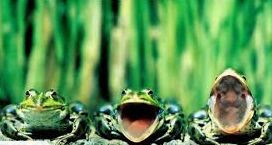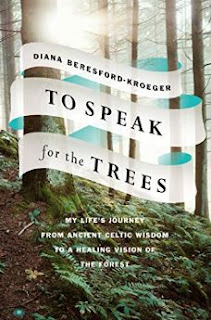I just read the book
To Speak for the Trees, My Life's Journey from Ancient Celtic Wisdom to a Healing Vision of the Forest, by Diana Beresford-Kroeger. Some facts I learned blew my mind, so I thought I'd share them with you.
Earlier I saw the film about her life and her travels to the forests of the world, titled
Call of the Forest: the Forgotten Wisdom of Trees. She has studied trees , botany, and biochemistry all her life.
She was taught as a child by druids, who shared with her their ancient knowledge of the natural world, so it would not be lost. She has studied trees all her life, learning all she could about their intricate systems, so like ours, and all of the medicinal, physical, mental and spiritual properties that keep us and our planet alive. She lives on 160 acres of forest, including eight acres of gardens, everything organic and attractive as wildlife habitat.
Diana grew up in Ireland, which had been clearcut, few trees surviving. "To the Druidic mind," she writes, "trees are sentient beings. .....this idea was shared by many of the ancient civilizations that lived in the vast virgin wildwoods of the past....There is a special word for this recognition of sentience,
mothaitheacht. It was described as a feeling in the upper chest of some kind of energy or sound passing through you.....infrasound or "silent" sound. These are sounds pitched below the range of human hearing, which travel great distances by means of long, loping waves. They are produced by large animals, such as elephants, and by volcanoes. And these waves have been measured as they emanate from large trees."
Her studies included looking far back in earth's history, to a time when ferns grew on earth. She was seeking the link between ferns and the evergreens that followed. "Earth's atmosphere at the time of change from ferns to evergreens had concentrations of carbon dioxide too high to sustain human life. ......Over the next 300 million years, the ferns, then cycads, then long-lost extinct evergreens and then gymnosperms and finally the flowering trees oxygenated our atmosphere. Green molecular machines continued to evolve, converting carbon into stalks, trunks, leaves, flowers and breathable air, each more powerful than the version that preceded it.
"Trees don't simply maintain the conditions necessary for human and most animal life on Earth;trees CREATED those conditions through the community of forests. Trees paved the way for the human family. The debt we owe them is too big to ever repay.
"....From there it was a short hop to my first understanding of the potential impact of human actions on the environment......Trees were responsible for the most basic necessity of life, the air we breathe. Forests were being cut down across the globe at breathtaking rates - quite literally breathtaking. In destroying them, we were destroying our own life support system.
Cutting down trees was a suicidal act."
She then describes the interconnection between trees and rivers and the ocean, and the life support systems that are linked directly between trees and the health of the ocean. She describes how clearcutting of an area led to the collapse of its marine ecosystems, and closes the chapter with
"Cutting down trees, then, is not exclusively a suicidal act. It is homicidal as well."
The author's studies revealed "Plants contain the sucrose version of serotonin.......a neuro-generator. By proving that the tryptophantryptamine pathways existed in trees, I proved that trees have the neural ability to listen and think; they have all the component parts necessary to have a mind or consciousness. That's what I proved: that
forests can think and perhaps even dream."
She is passionate about our need to plant trees and do everything in our power to counter climate change. Reassuringly, she states, "Every effort to aid and encourage the natural world is as valuable as every other. Whether we are the mighty or the meek, we must all act to stop climate change......If every person on Earth planted one tree per year for the next six years, we could stop climate change in its tracks.......Three hundred million years ago, trees took an environment with a toxic load of carbon and turned it into something that could sustain human life. They can do it again.
"The true goal of the global bioplan is for every person to create and protect the healthiest environment they can for themselves, their families, the birds, insects and wildlife. That bioplan then gets stitched to their neighbours', expanding outward exponentially. If we each start with something as small as an acorn and nurture it into an oak, a master tree that we have grown and protect and are a steward of, if we have that kind of thinking on a mass scale, then the planet is no longer in jeopardy from our greed. We've become the guardians of it.
It's a dream of trying to get a better world for every living thing.
....."In short, embedded in the DNA of the tree is the ability to create the specific conditions necessary to give rise to a rainbow of species.........
She noted, through observation, that "Every time we located a truly spectular tree, the environment immediately around it was healthy and there was a feeling that everything in that zone of health was leaning in towards the tree..........They were the epicentres of life in the forest.......I call them "mother trees".
"Mother trees are dominant trees within any forest system. They are the trees that, when mature, serve up the twenty-two essental amino acids, the three essential fatty acids, the vegetable proteins and complex sugars....that feed the natural world. This menu protects the ability for all of nature to propagate, from the world of insects, to the pollinators, to birds, to the small and larger mammals.
"Mother trees can feed and protect other trees within the expanse of their canopy. They are the leaders of the community we call forests. And across the globe, forests represent life.
"Mother trees have an effect on the oceans as well." She describes how leaves fall, carry iron to the waterways, feeding the fish and mammals of the sea. "In addition, trees produce pollen in the spring...This is the cradle of the creation of our weather patterns. The human family thrives on a plentiful supply of rainwater - all from the bounty of mother trees......
"The genetic information of a mother tree is perhaps the most important living library there is."
She concludes optimistically, "We will save the forests and our planet. The trees are telling us how to do just that - all we have to do is listen and remember."















